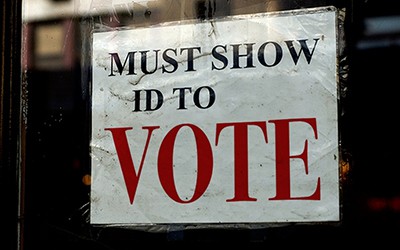Over the past few weeks, courts across the nation have rejected a number of state laws that were recently passed with the intent to restrict access to vote. Although the sponsors of the various state laws claim that the laws are intended to “prevent voter fraud,” in truth they are aimed at preventing poor and minority voters from voting by requiring specific types of ID to vote, eliminating early voting, and implementing a number of other measures that make it harder to vote. As the presidential election nears, the courts are seeing through the “voter fraud” ruse, and repeatedly rejecting these laws.
TEXAS: On July 20, the federal Fifth Circuit Court of Appeals, sitting en banc, struck down a voter suppression law in Texas in a 9-6 vote. The law required specific kinds of ID to vote at the polls. The case, Veasey v. Abbott, focused on whether the Texas law violated the Voting Rights Act , which prohibits voting laws that result “in a denial or abridgement of the right of any citizen…to vote on account of race or color.” Experts in the case testified that Hispanic and African-American voters are “respectively 195% and 305% more likely than their Anglo peers to lack” voter ID. The majority of the appeals court ultimately found that the Texas law had an unlawful racially discriminatory impact.
NORTH CAROLINA: On July 29, the federal Fourth Circuit Court of Appeals struck down a voter suppression law in North Carolina in a case called NAACP v McCrory. The law required strict voter ID, cut out a week of early voting, eliminated same-day voter registration, eliminated out of precinct voting, and eliminated pre-registration for 16- and 17-year-olds. Before enacting the law, the state legislature had requested data on the use, by race, of a number of voting practices. Upon receipt of the race data, the law was enacted. The appeals court found that the law violated the Voting Rights Act and the 14th Amendment because the state acted with a racially discriminatory intent when it “targeted African Americans with almost surgical precision.” In one particularly illuminating passage of the court’s opinion, it stated: “The photo ID requirement, which applies only to in-person voting and not to absentee voting, is too narrow to combat fraud. On the one hand, the State has failed to identify even a single individual who has ever been charged with committing in-person voter fraud in North Carolina. On the other, the General Assembly did have evidence of alleged cases of mail- in absentee voter fraud. Notably, the legislature also had evidence that absentee voting was not disproportionately used by African Americans; indeed, whites disproportionately used absentee voting. The General Assembly then exempted absentee voting from the photo ID requirement.”
WISCONSIN: On July 29, a federal district court in Wisconsin struck down several parts of a Wisconsin voter suppression law in a case called One Wisconsin Institute v. Thomsen. The court found the provisions limiting absentee voting, setting certain residency and citizenship requirements, and prohibiting the use of expired student IDs to be unconstitutional. The court held: “The evidence in this case casts doubt on the notion that voter ID laws foster integrity and confidence. The Wisconsin experience demonstrates that a preoccupation with mostly phantom election fraud leads to real incidents of disenfranchisement, which undermine rather than enhance confidence in elections, particularly in minority communities. To put it bluntly, Wisconsin’s strict version of voter ID law is a cure worse than the disease. . . . The most pointed problem with Wisconsin’s voter ID law is that it lacks a functioning safety net for qualified electors who cannot get a voter ID with reasonable effort. The [ID petition process] is supposed to be this safety net, but . . . [it] is pretty much a disaster. It disenfranchised about 100 qualified electors —the vast majority of whom were African American or Latino—who should have been given IDs to vote in the April 2016 primary.”
NORTH DAKOTA: On August 1, a federal court enjoined North Dakota from implementing its voter suppression law, which required a specific type of ID to vote, in a case called Brakebill v Jaeger. The law required an official government-issued ID with a residential street address. The court held: “The undisputed evidence before the Court reveals that Native Americans face substantial and disproportionate burdens in obtaining each form of ID deemed acceptable under the new law. . . . obtaining a qualifying voter ID is much easier to accomplish for people who live in urban areas, have a good income, are computer-literate, have a computer and printer, have a good car and gas money, have a flexible schedule, and understand how to navigate the state’s administrative procedures. The declarations from the Plaintiffs’ expert witnesses show that the typical Native American voter living in North Dakota who lacks qualifying ID simply does not have these assets. . . . The record is replete with concrete evidence of significant burdens imposed on Native American voters attempting to exercise their right to vote in North Dakota.” The court concluded that the law violates the Equal Protection Clause of the 14th Amendment.

